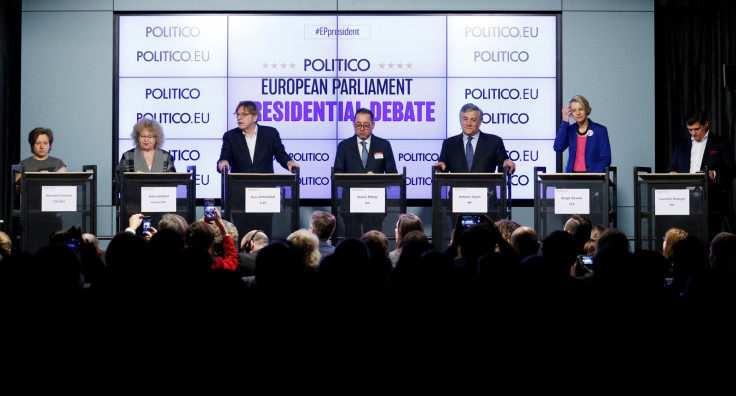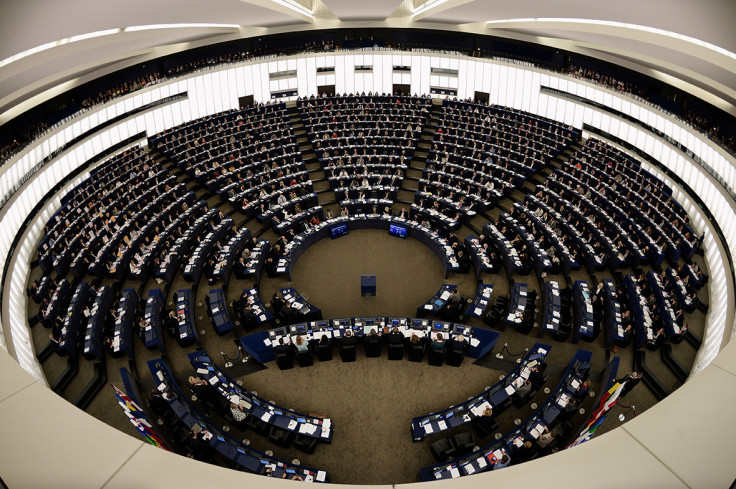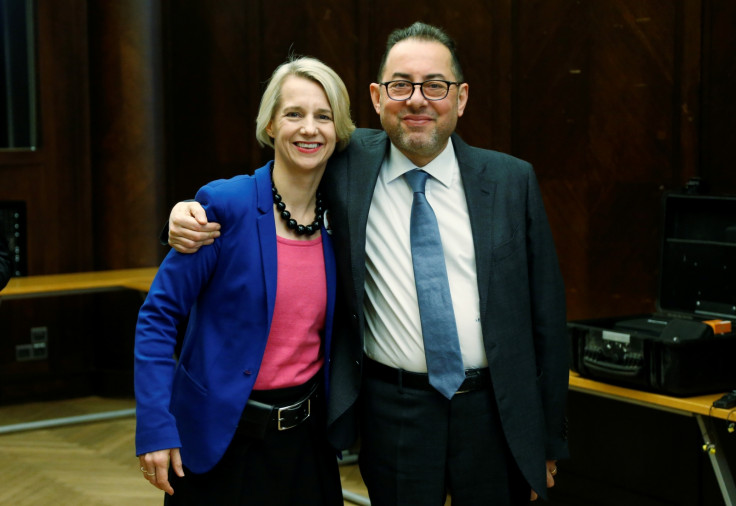One of these eight MEPs will be the next president of the European Parliament
The two front-runners are both Italian. Three of them are women. Only one of them is British.

The Members of the European Parliament (MEPs) will elect a new president on Tuesday (17 January 2017), with the voting session starting 9am in Strasbourg (8am GMT). The outgoing president, German Social-democrat Martin Schulz, announced he would step down in November to run for the German parliament.
The 751 MEPs, who are directly elected by the citizens of the 28 European Union member states in elections occurring every five years, express their preference in a secret ballot. An absolute majority of 50% + 1 of the votes casted is needed to win but, if after three rounds of voting there is no clear majority, the fourth ballot will see a head-to-head between the two highest-scoring candidates.
A simple majority of votes is needed to win in this round. Should there be a tie, then the winner is the oldest candidate.
There are eight candidates competing, one for each parliamentary group. After the recent debacle between the Five Star Movement and Ukip, the co-founders of the Europe for Freedom and Direct Democracy group, the candidate of choice Piernicola Pedicini will no longer receive Ukip's backing, and did not take part in the debate the newspaper Politico hosted among the candidates last week.
Among the others, the candidate with the highest chances of winning is Antonio Tajani of the European People's Party (EPP) group, a centre-right coalition encompassing delegations from 52 national parties from all of the EU member states bar the UK. The EPP is the largest group in the parliament, controlling 217 seats.
Tajani cuts a controversial figure due to his previous ties to former Italian prime minister Silvio Berlusconi. In 1994, Tajani helped founding Berlusconi's party Forza Italia and worked as Berlusconi's spokesperson in 1994 and 1995, during the controversial politician's first term in power. Also in 1994 Tajani was first elected to the European parliament.
Tajani's main opponent is another Italian MEP, Gianni Pittella, who belongs to the ranks of the Progressive Alliance of Socialists and Democrats Group, the second-largest in the parliament with 189 MEPs. Sitting in the parliament since 1999, Pittella is against the current coalition of centre-right and centre-left groups and pledged to refocus economic policy away from austerity measures.

Another Italian among the candidates is Eleonora Forenza, who stands with the left-wing European United Left-Nordic Green Left Group, a smaller party counting 52 MEPs. Forenza is a vocal opponent of the Transatlantic Trade and Investment Partnership (TTIP), a trade deal that was under negotiation between the EU and the US. She was elected to the parliament in 2014 as a candidate of The Other Europe, a pan-European left-wing political alliance that supported Greek Prime Minister Alexis Tsipras for the European Commission presidency.
Guy Verhofstadt is the candidate that has arguably made the most amount of headlines in the past week after shutting the door to the anti-establishment and Eurosceptic party Five Star Movement who sought to join Verhofstadt's pro-EU integration Alliance of Liberals and Democrats for Europe (ALDE), which counts 68 MEPs. Verhofstadt, who is also a chief Brexit negotiator, has spoken in favour of a stronger integration among EU countries, shaping the union towards a federalist model.
"That is majority ruling, a government, a treasury, a common defence – that doesn't mean member states will disappear, they will not disappear, but there has to be a balance between the efficiency in which we can take decisions at a federal level and the autonomy and identity of our member states," the former prime minister of Belgium told IBTimes UK in November last year.
Another candidate ailing from Belgium is Helga Stevens, the choice of the European Conservatives and Reformists group. The group is the third-biggest in the parliament and counts MEPs from the British Conservative party among its member delegations. A former lawyer, Stevens was director and president of lobby group the European Union of the Deaf and she has made a name for herself defending the rights of people with disabilities.
Fellow MEP Ian Duncan described her: "Flanked by her signers, Helga is an articulate spokesperson who never says a word. Nonetheless whoever interprets her words, male or female, you are left in no doubt that you are hearing Helga's distinct and clear voice".

The only British candidate is Green Party MEP Jean Lambert, who has been a member of the parliament since 1999 and sides with the Greens/European Free Alliance, which counts a total 50 MEPs. In relation to Brexit, Lambert said: "Because I feel so strongly about the value of the EU, and because I am proud to represent the people of the UK – London in particular – I know that the UKs' exit from the EU must be, as far as is a possible, a win-win process and I am clear that it must not damage the future prospects of the EU."
On the opposite side of the spectrum is Romanian Laurenţiu Rebega, representing the 39-MEP strong Europe of Nations and Freedom Group led by Marine Le Pen's National Front and Geert Wilders' Freedom Party. In the debate organised by Politico, Rebega was the only candidate who said that English should no longer be a main working language of the European Union following Brexit.
Three things to know about the role of the president of the European Parliament
- The president represents the parliament among the EU institutions and world leaders and represents the voice of the parliament before the European Council
- The role involves overseeing parliamentary activities, including chairing the parliamentary plenary sittings, the conference of the presidents of political groups and the bureau of parliament
- The president signs the EU budget into law and co-signs legislation with the president of the European Council
© Copyright IBTimes 2024. All rights reserved.






